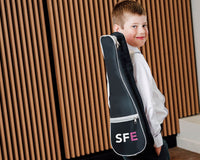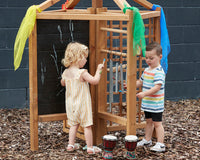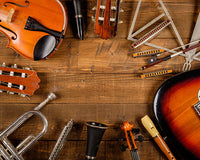
Whether you are a new time player or an experienced brass musician, there are all sorts of vital accessories for all brass instruments. Covering mutes to stands, this blog will try to clarify what’s what to give you a fuller understanding of your brass instruments needs.
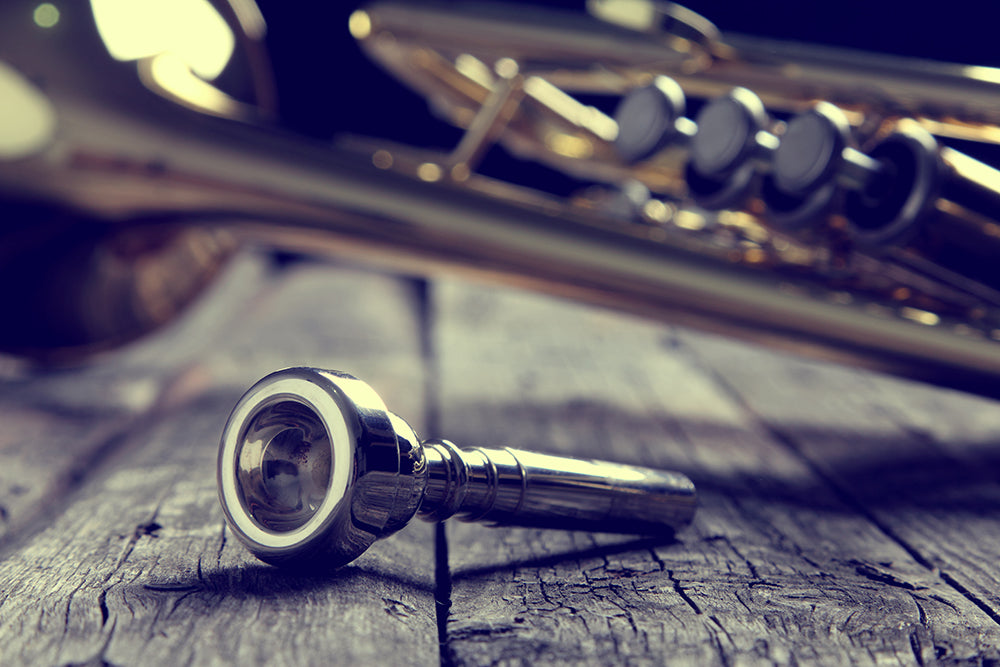
Every brass instrument requires a mouthpiece in order to achieve a sound. All brass instruments you purchase from us will come with a standard sized mouthpiece. However, particularly as you progress through the grades, you will discover that you need different size mouthpieces to help you strengthen your flaws.
For example, a shallow mouthpiece will help you in the higher register but will slightly harshen your tone (quality of sound), whereas a deeper mouthpiece will increase your tonal quality but subsequently it would make it that bit harder to comfortably play within the higher register. Standard mouthpiece sizes for all brass instruments are as follows: cornet (4B), trumpet (7C), trombone (6.5 AL), euphonium (5G/51D), French horn (5N), Tuba (3L), tenor horn (3) and baritone (9BS). So, when buying a mouthpiece, remember, the larger the mouthpiece’s name, the shallower it is and hence the easier it is to achieve those high notes with the consequence of lesser tone quality and vice versa, (ie, an 8A is shallower than a 7c for the trumpet.)

All brass instruments have mutes that can go with their instrument. The aim of the mute is not to silence the instrument but to change the tone of the instrument, which is why the use of mutes is only necessary in bands. Different pieces will require different sounds.
Almost every brass instrument can use a straight mute. This is a cone shaped mute, which produces a piercing, bright sound. The material used to make the mute also affect this, ie the Denis Wick Aluminum mute is brighter than the Humes and Berg Stonelined mute.
Another common type of mute for brass instruments is the cup mute. The cup mute is effectively the straight mute with a cup on the end and it produces a softer, more muffled sound.
The third super useful mute for most brass instruments is the Silent Brass System. This mute is not ever used in bands and is designed for personal use only. The mute more or less kills the sound of the Instrument, to a point that people could be watching TV in the next room, undisturbed. This is ideal for people who have to practice in a flat or with other people whom you could possibly disturb whilst practicing at full volume. This mute design is only available for the Trumpet, Euphonium, Trombone, French horn and Baritone.
There are other mutes (Harmon mute, bucket mute and the plunger.) These are mostly used at a higher standard of playing, although offers hours of fun for players of all levels.

At one point or another, brass players will eventually realise that they need an instrument stand. Whether it be in the practice room, recording studio or even your own bedroom, an instrument stand will always be a handy necessity. They are very stable, able to hold your instrument comfortably while you have a break from playing. They are also relatively cheap, currently ranging between £15 - £80. They are very reliable and tend to last for life as long as they're treated appropriately.
Instrument stands are sold for a range of brass instruments.
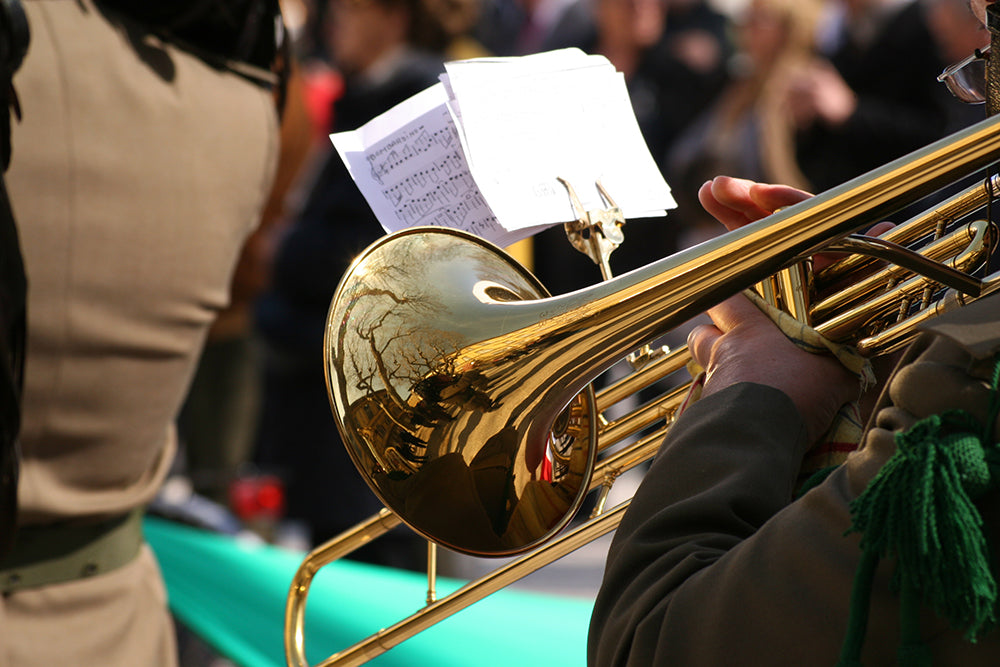
Lyres are used in marching bands. Apart from that they aren’t commonly used at all. You can acquire lyres for the trumpet/cornet, trombone, euphonium, baritone, tuba, tenor horn and bass trombone. They are extremely useful for holding up your music for you without the need for an actual music stand.
Most instruments have something called a lyre box, which allows the lyre to be screwed into place. This is very versatile as you can adjust the height. You could also have a lyre that attaches to the bell or the lead pipe. All lyres are very stable, reliable and essential for players in a marching band. On a personal level I would recommend the clip on bell lyre that is guaranteed to fit virtually all instruments regardless of make or model.

Valve oil is used on every brass instrument except for the trombone, which uses slide oil and water.
Valve oil and slide oil is needed to play the instrument, without it, there will come a time where you can no longer play your instrument. After some time, the valves in brass instruments will start to stiffen, making playing very awkward and at times impossible. Preferably before this point you will need to take the valves out of the instrument, clean them with a cloth and then put some oil on the valves and carefully place the valves back in the instrument.
With trombones, you will regularly need to grease or spray your slide (depending on what product you choose.). Only certain instruments come with valve/slide oil, so if the instrument you get doesn’t come with this, make sure you purchase some there and then as you never know when you’ll need it.
Handy Blogs:
http://www.normans.co.uk/blog/2015/11/best-gifts-for-brass-players/
http://www.normans.co.uk/blog/2015/02/video-review-yamaha-sb7x-silent-brass-system/
http://www.normans.co.uk/blog/2014/11/video-review-brass-straight-mutes/
http://www.normans.co.uk/blog/2014/11/video-brass-cup-mutes/
http://www.normans.co.uk/blog/2014/08/different-types-brass-instrument-mutes/
http://www.normans.co.uk/blog/2014/08/list-brass-instruments/
http://www.normans.co.uk/blog/2014/04/anatomy-brass-instrument-mouthpiece/
 Whether you are a new time player or an experienced brass musician, there are all sorts of vital accessories for all brass instruments. Covering mutes to stands, this blog will try to clarify what’s what to give you a fuller understanding of your brass instruments needs.
Whether you are a new time player or an experienced brass musician, there are all sorts of vital accessories for all brass instruments. Covering mutes to stands, this blog will try to clarify what’s what to give you a fuller understanding of your brass instruments needs.
 Every brass instrument requires a mouthpiece in order to achieve a sound. All brass instruments you purchase from us will come with a standard sized mouthpiece. However, particularly as you progress through the grades, you will discover that you need different size mouthpieces to help you strengthen your flaws.
For example, a shallow mouthpiece will help you in the higher register but will slightly harshen your tone (quality of sound), whereas a deeper mouthpiece will increase your tonal quality but subsequently it would make it that bit harder to comfortably play within the higher register. Standard mouthpiece sizes for all brass instruments are as follows: cornet (4B), trumpet (7C), trombone (6.5 AL), euphonium (5G/51D), French horn (5N), Tuba (3L), tenor horn (3) and baritone (9BS). So, when buying a mouthpiece, remember, the larger the mouthpiece’s name, the shallower it is and hence the easier it is to achieve those high notes with the consequence of lesser tone quality and vice versa, (ie, an 8A is shallower than a 7c for the trumpet.)
Every brass instrument requires a mouthpiece in order to achieve a sound. All brass instruments you purchase from us will come with a standard sized mouthpiece. However, particularly as you progress through the grades, you will discover that you need different size mouthpieces to help you strengthen your flaws.
For example, a shallow mouthpiece will help you in the higher register but will slightly harshen your tone (quality of sound), whereas a deeper mouthpiece will increase your tonal quality but subsequently it would make it that bit harder to comfortably play within the higher register. Standard mouthpiece sizes for all brass instruments are as follows: cornet (4B), trumpet (7C), trombone (6.5 AL), euphonium (5G/51D), French horn (5N), Tuba (3L), tenor horn (3) and baritone (9BS). So, when buying a mouthpiece, remember, the larger the mouthpiece’s name, the shallower it is and hence the easier it is to achieve those high notes with the consequence of lesser tone quality and vice versa, (ie, an 8A is shallower than a 7c for the trumpet.)
 All brass instruments have mutes that can go with their instrument. The aim of the mute is not to silence the instrument but to change the tone of the instrument, which is why the use of mutes is only necessary in bands. Different pieces will require different sounds.
Almost every brass instrument can use a straight mute. This is a cone shaped mute, which produces a piercing, bright sound. The material used to make the mute also affect this, ie the Denis Wick Aluminum mute is brighter than the Humes and Berg Stonelined mute.
Another common type of mute for brass instruments is the cup mute. The cup mute is effectively the straight mute with a cup on the end and it produces a softer, more muffled sound.
The third super useful mute for most brass instruments is the Silent Brass System. This mute is not ever used in bands and is designed for personal use only. The mute more or less kills the sound of the Instrument, to a point that people could be watching TV in the next room, undisturbed. This is ideal for people who have to practice in a flat or with other people whom you could possibly disturb whilst practicing at full volume. This mute design is only available for the Trumpet, Euphonium, Trombone, French horn and Baritone.
There are other mutes (Harmon mute, bucket mute and the plunger.) These are mostly used at a higher standard of playing, although offers hours of fun for players of all levels.
All brass instruments have mutes that can go with their instrument. The aim of the mute is not to silence the instrument but to change the tone of the instrument, which is why the use of mutes is only necessary in bands. Different pieces will require different sounds.
Almost every brass instrument can use a straight mute. This is a cone shaped mute, which produces a piercing, bright sound. The material used to make the mute also affect this, ie the Denis Wick Aluminum mute is brighter than the Humes and Berg Stonelined mute.
Another common type of mute for brass instruments is the cup mute. The cup mute is effectively the straight mute with a cup on the end and it produces a softer, more muffled sound.
The third super useful mute for most brass instruments is the Silent Brass System. This mute is not ever used in bands and is designed for personal use only. The mute more or less kills the sound of the Instrument, to a point that people could be watching TV in the next room, undisturbed. This is ideal for people who have to practice in a flat or with other people whom you could possibly disturb whilst practicing at full volume. This mute design is only available for the Trumpet, Euphonium, Trombone, French horn and Baritone.
There are other mutes (Harmon mute, bucket mute and the plunger.) These are mostly used at a higher standard of playing, although offers hours of fun for players of all levels.
 At one point or another, brass players will eventually realise that they need an instrument stand. Whether it be in the practice room, recording studio or even your own bedroom, an instrument stand will always be a handy necessity. They are very stable, able to hold your instrument comfortably while you have a break from playing. They are also relatively cheap, currently ranging between £15 - £80. They are very reliable and tend to last for life as long as they're treated appropriately.
Instrument stands are sold for a range of brass instruments.
At one point or another, brass players will eventually realise that they need an instrument stand. Whether it be in the practice room, recording studio or even your own bedroom, an instrument stand will always be a handy necessity. They are very stable, able to hold your instrument comfortably while you have a break from playing. They are also relatively cheap, currently ranging between £15 - £80. They are very reliable and tend to last for life as long as they're treated appropriately.
Instrument stands are sold for a range of brass instruments.
 Lyres are used in marching bands. Apart from that they aren’t commonly used at all. You can acquire lyres for the trumpet/cornet, trombone, euphonium, baritone, tuba, tenor horn and bass trombone. They are extremely useful for holding up your music for you without the need for an actual music stand.
Most instruments have something called a lyre box, which allows the lyre to be screwed into place. This is very versatile as you can adjust the height. You could also have a lyre that attaches to the bell or the lead pipe. All lyres are very stable, reliable and essential for players in a marching band. On a personal level I would recommend the clip on bell lyre that is guaranteed to fit virtually all instruments regardless of make or model.
Lyres are used in marching bands. Apart from that they aren’t commonly used at all. You can acquire lyres for the trumpet/cornet, trombone, euphonium, baritone, tuba, tenor horn and bass trombone. They are extremely useful for holding up your music for you without the need for an actual music stand.
Most instruments have something called a lyre box, which allows the lyre to be screwed into place. This is very versatile as you can adjust the height. You could also have a lyre that attaches to the bell or the lead pipe. All lyres are very stable, reliable and essential for players in a marching band. On a personal level I would recommend the clip on bell lyre that is guaranteed to fit virtually all instruments regardless of make or model.
 Valve oil is used on every brass instrument except for the trombone, which uses slide oil and water.
Valve oil and slide oil is needed to play the instrument, without it, there will come a time where you can no longer play your instrument. After some time, the valves in brass instruments will start to stiffen, making playing very awkward and at times impossible. Preferably before this point you will need to take the valves out of the instrument, clean them with a cloth and then put some oil on the valves and carefully place the valves back in the instrument.
With trombones, you will regularly need to grease or spray your slide (depending on what product you choose.). Only certain instruments come with valve/slide oil, so if the instrument you get doesn’t come with this, make sure you purchase some there and then as you never know when you’ll need it.
Handy Blogs:
http://www.normans.co.uk/blog/2015/11/best-gifts-for-brass-players/
http://www.normans.co.uk/blog/2015/02/video-review-yamaha-sb7x-silent-brass-system/
http://www.normans.co.uk/blog/2014/11/video-review-brass-straight-mutes/
http://www.normans.co.uk/blog/2014/11/video-brass-cup-mutes/
http://www.normans.co.uk/blog/2014/08/different-types-brass-instrument-mutes/
http://www.normans.co.uk/blog/2014/08/list-brass-instruments/
http://www.normans.co.uk/blog/2014/04/anatomy-brass-instrument-mouthpiece/
Valve oil is used on every brass instrument except for the trombone, which uses slide oil and water.
Valve oil and slide oil is needed to play the instrument, without it, there will come a time where you can no longer play your instrument. After some time, the valves in brass instruments will start to stiffen, making playing very awkward and at times impossible. Preferably before this point you will need to take the valves out of the instrument, clean them with a cloth and then put some oil on the valves and carefully place the valves back in the instrument.
With trombones, you will regularly need to grease or spray your slide (depending on what product you choose.). Only certain instruments come with valve/slide oil, so if the instrument you get doesn’t come with this, make sure you purchase some there and then as you never know when you’ll need it.
Handy Blogs:
http://www.normans.co.uk/blog/2015/11/best-gifts-for-brass-players/
http://www.normans.co.uk/blog/2015/02/video-review-yamaha-sb7x-silent-brass-system/
http://www.normans.co.uk/blog/2014/11/video-review-brass-straight-mutes/
http://www.normans.co.uk/blog/2014/11/video-brass-cup-mutes/
http://www.normans.co.uk/blog/2014/08/different-types-brass-instrument-mutes/
http://www.normans.co.uk/blog/2014/08/list-brass-instruments/
http://www.normans.co.uk/blog/2014/04/anatomy-brass-instrument-mouthpiece/





